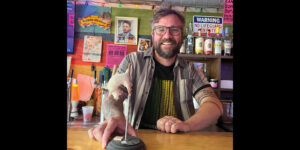Few vocalists hold the recital stage like British tenor Ian Bostridge, who brings his operatic chops to Union College’s Memorial Chapel on Feb. 10.
It has everything to do with how he conveys the meaning of the words he sings and what he does with his voice.
“You must grab people’s attention,” Bostridge told saratoga living last December from London. “You must engage them. You need to communicate. The voice is the servant of the interpretation,” he explained. “There’s too much pressure on having a beautiful voice and to sing loudly. Having a beautiful voice is not interesting to me. After two minutes it becomes boring. If a singer is doing a song cycle of 50 minutes, the listener’s ear adjusts to the voice, and they take it for granted. But beauty and ugliness captures their attention.”
Bostridge loves to sing songs that take his audience on an emotional journey. He works with texts that allow him to sing not just pretty tones, but also grunts, whispers, and other “weird colors,” as he puts it. Bostridge performs in a disarmingly casual way as he leans against the piano or walks about the stage to tell the song’s story.
Although he sings lieder by Mahler, Brahms, Wolf, Schumann, and Beethoven, his favorite material comes from the pen of Franz Schubert. “[Schubert] has a huge variety, and at his peak, the songs are incredibly powerful,” Bostridge said. Schubert (1797-1828) not only wrote symphonies, string quartets, chamber music, and piano works; but he also turned out more than 600 songs. “It’s quite a lot,” Bostridge told us with a laugh. “And they’re all pretty great. I’ve sung only about 200 of them and explored another 250. Some are not well known and they all vary in intensity.”
Schubert set his songs to the texts of almost 100 poets, particularly Goethe and Wilhelm Müller. Out of the 22 Schubert songs Bostridge will perform is the famed “Erlkonig” (“The Erl King”), which is set to a Goethe poem; and he’s opening with a trio of songs set to poetry. These include: Matthaus Kazimir von Colin’s “Wehmut” (“Melancholy”); “Der Zwerg” (“The Dwarf”), which in Bostridge’s opinion, is “not a good poem but Schubert turned it into a great song”; and “Nacht und Traume” (“Night and Dreams”).
Presenting these three songs together, Bostridge said, enables him to create an atmosphere, which sets the stage for what comes afterwards. “That’s part of why I’m drawn to Schubert again and again,” he said. “He was the first great lieder writer and he was writing for the new piano, which had become a more powerful instrument. It makes the partnership between the voice and piano more equal … almost symphonic. And he was inventing new styles and he was the first to create cycles. ‘Winterreise’ (‘Winter Journey’), based on Müller’s poems, is the greatest cycle in classical music.”
Performing a three-song cycle has become something of an obsession for Bostridge, who tours with the concept regularly—four of the six concerts he’s performing in February on his North American tour feature this cycle. He even wrote a book detailing how he came to interpret each of the cycle’s 24 songs in Schubert’s Winter Journey: Anatomy of an Obsession. Bostridge sang the cycle in 2015 at Union with accompanist Wenwen Du, whom he recently worked with in California. He’s spent almost 30 years performing this work.
For the Union concert, Bostridge will be joined by his longtime pianist Julius Drake, who was the accompanist for their recent album Songs by Schubert, Vol. 3. “He’s great. He has the instinct as to how we phrase and we trust each other,” Bostridge said of his accompanist. “But I also try to work with younger people. They sometimes provide inspiration with new colors.”
—Geraldine Freedman















